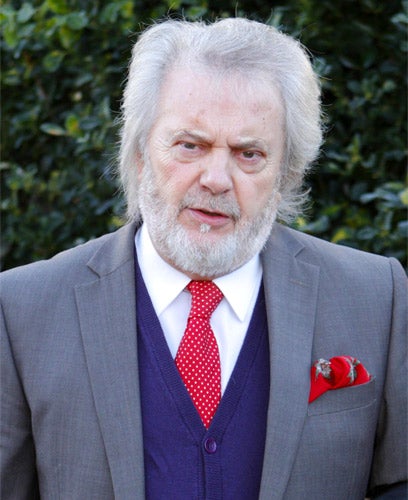Aide's arrest was motivated by World Cup failure, says Russia

Your support helps us to tell the story
From reproductive rights to climate change to Big Tech, The Independent is on the ground when the story is developing. Whether it's investigating the financials of Elon Musk's pro-Trump PAC or producing our latest documentary, 'The A Word', which shines a light on the American women fighting for reproductive rights, we know how important it is to parse out the facts from the messaging.
At such a critical moment in US history, we need reporters on the ground. Your donation allows us to keep sending journalists to speak to both sides of the story.
The Independent is trusted by Americans across the entire political spectrum. And unlike many other quality news outlets, we choose not to lock Americans out of our reporting and analysis with paywalls. We believe quality journalism should be available to everyone, paid for by those who can afford it.
Your support makes all the difference.The arrest of a Westminster MP's female aide on suspicion of spying for Russia was an attempt to sabotage improving relations between London and Moscow, as well as an effort to distract from England's failure to host the World Cup in 2018, according to Russia's most senior diplomat in the UK.
Alexander Sternik, the chargé d'affaires and acting ambassador at the Russian embassy in London, yesterday warned that the affair is being viewed extremely seriously in the Kremlin and indicated that retaliations may follow against British interests, "looking at the history of similar cases". He complained that consular officials have still not been able to get access to Katia Zatuliveter. The 25-year-old was detained a week ago amid suspicions she was using her position as an assistant to Liberal Democrat MP Mike Hancock to pass information to Russian intelligence.
Ms Zatuliveter yesterday launched an appeal against a deportation order which has been served on her. Mr Sternik said that in response to repeated requests for information from the Russian mission the Foreign Office had claimed that the young blonde woman from the Caucasus was being held on immigration matters rather than for any espionage activity.
He had absolutely no evidence, he maintained, that she was a member of his country's intelligence service and that the only contact the embassy has had with her was to provide her recently with a new passport.
The Russian view of the affair, said Mr Sternik, was that Mr Hancock was being targeted because he was a parliamentarian who "showed and sympathy and understanding for the modern Russian state".
A series of questions about British nuclear and submarine policy have emanated from the office of Mr Hancock, whose constituency of Portsmouth South is the home of a major naval base. Government ministers have refused to answer some of the questions on security grounds.
Mr Hancock, the chairman of the European parliamentary group's all-party group on Russia, has been criticised by colleagues for his alleged pro-Moscow views. He had also built up a reputation for having a string of female Russian and east European "assistants" who, according to colleagues such as the Hungarian Mátyás Eörsi, were "all blonde and attractive and all around 25 and under in age".
Mr Sternik maintained that an upsurge of xenophobic reports about Russia was "despite and not because of the policy" of the David Cameron Government, which has tried to improve links between the two countries.
It was apparent, he said, that "some quarters" in this country were trying to undermine the rapport. "I simply do not see how anybody could be interested in spoiling these positive trends in such an obvious and blunt manner. It is very conspicuous that as soon as the green shoots show through the rubble in the Russian-British relationship, these sorts of scandals break out. That's a fact of life."
Mr Hancock meanwhile signed and then withdrew his name from a Commons early day motion which stated "that it would be a good idea if all those individuals and organisations involved in the failed World Cup bid showed a little humility and good grace instead of continually whinging and moaning about the unfairness of FIFA and the bidding process; while regretting that England was able only to accumulate two votes out of 22, congratulates Russia and Qatar on their success in bringing World Cup football to two parts of the world which have never hosted the World Cup before."
The Russian chargé was insistent that media reports about the case were a "PR stunt" to distract from "more acute and tangible problems" – namely the WikiLeaks release of embarrassing US diplomatic cables and England's failed bid to host the 2018 World Cup.
Asked if he thought British officials were behind the stories, he said: "I strongly hope that this is a spontaneous, sporadic and not orchestrated campaign against Russia because it goes against the current of improving Russian-British relations."
In an attack on the Foreign Office, Mr Sternik said: "The embassy got to know about it from the mass media and not directly from the officials here in Britain. We have a bilateral consular convention which specifically prescribes the sides to immediately notify each other should an arrest or detention of their citizens take place. We have been quite disappointed with the passiveness that was shown in this respect."
The Foreign Office eventually told the embassy that Miss Zatuliveter had been detained under immigration legislation and has not mentioned the spying allegations in official exchanges, the chargé said. "That of course remains a striking contrast with what the press is saying about the reasons for her detention."
He added: "We have not received, although we insisted on this, any clarification as to the motives and the reasons that this detention was made."
Join our commenting forum
Join thought-provoking conversations, follow other Independent readers and see their replies
Comments